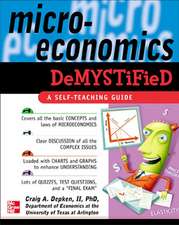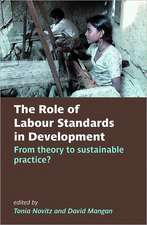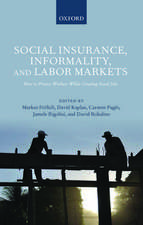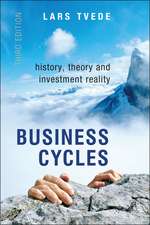The Labour Theory of Value: Routledge Frontiers of Political Economy
Autor Peter C. Dooleyen Limba Engleză Paperback – 31 iul 2009
| Toate formatele și edițiile | Preț | Express |
|---|---|---|
| Paperback (1) | 322.65 lei 6-8 săpt. | |
| Taylor & Francis – 31 iul 2009 | 322.65 lei 6-8 săpt. | |
| Hardback (1) | 758.34 lei 6-8 săpt. | |
| Taylor & Francis – 26 mai 2005 | 758.34 lei 6-8 săpt. |
Din seria Routledge Frontiers of Political Economy
-
 Preț: 249.76 lei
Preț: 249.76 lei -
 Preț: 260.12 lei
Preț: 260.12 lei - 26%
 Preț: 758.53 lei
Preț: 758.53 lei - 26%
 Preț: 758.53 lei
Preț: 758.53 lei - 26%
 Preț: 756.43 lei
Preț: 756.43 lei - 14%
 Preț: 757.47 lei
Preț: 757.47 lei -
 Preț: 253.10 lei
Preț: 253.10 lei - 26%
 Preț: 735.65 lei
Preț: 735.65 lei - 26%
 Preț: 757.47 lei
Preț: 757.47 lei - 26%
 Preț: 757.47 lei
Preț: 757.47 lei - 18%
 Preț: 234.48 lei
Preț: 234.48 lei - 14%
 Preț: 330.25 lei
Preț: 330.25 lei - 26%
 Preț: 758.53 lei
Preț: 758.53 lei - 17%
 Preț: 250.90 lei
Preț: 250.90 lei - 26%
 Preț: 756.11 lei
Preț: 756.11 lei - 26%
 Preț: 757.27 lei
Preț: 757.27 lei - 26%
 Preț: 758.11 lei
Preț: 758.11 lei - 26%
 Preț: 1201.71 lei
Preț: 1201.71 lei - 26%
 Preț: 759.16 lei
Preț: 759.16 lei - 49%
 Preț: 565.25 lei
Preț: 565.25 lei - 26%
 Preț: 1172.06 lei
Preț: 1172.06 lei - 26%
 Preț: 845.43 lei
Preț: 845.43 lei - 23%
 Preț: 296.32 lei
Preț: 296.32 lei - 26%
 Preț: 755.52 lei
Preț: 755.52 lei - 26%
 Preț: 519.23 lei
Preț: 519.23 lei - 26%
 Preț: 1035.71 lei
Preț: 1035.71 lei - 26%
 Preț: 841.51 lei
Preț: 841.51 lei - 26%
 Preț: 810.60 lei
Preț: 810.60 lei - 26%
 Preț: 813.63 lei
Preț: 813.63 lei - 26%
 Preț: 813.63 lei
Preț: 813.63 lei - 26%
 Preț: 1172.15 lei
Preț: 1172.15 lei - 22%
 Preț: 299.61 lei
Preț: 299.61 lei - 14%
 Preț: 520.49 lei
Preț: 520.49 lei - 26%
 Preț: 841.70 lei
Preț: 841.70 lei - 15%
 Preț: 635.39 lei
Preț: 635.39 lei - 18%
 Preț: 1003.41 lei
Preț: 1003.41 lei - 26%
 Preț: 810.60 lei
Preț: 810.60 lei - 26%
 Preț: 985.94 lei
Preț: 985.94 lei - 26%
 Preț: 843.82 lei
Preț: 843.82 lei - 26%
 Preț: 813.86 lei
Preț: 813.86 lei - 26%
 Preț: 843.65 lei
Preț: 843.65 lei - 26%
 Preț: 755.52 lei
Preț: 755.52 lei - 26%
 Preț: 814.60 lei
Preț: 814.60 lei - 14%
 Preț: 521.54 lei
Preț: 521.54 lei - 14%
 Preț: 756.58 lei
Preț: 756.58 lei - 26%
 Preț: 757.47 lei
Preț: 757.47 lei - 26%
 Preț: 556.19 lei
Preț: 556.19 lei - 26%
 Preț: 843.31 lei
Preț: 843.31 lei
Preț: 322.65 lei
Preț vechi: 418.06 lei
-23% Nou
Puncte Express: 484
Preț estimativ în valută:
61.80€ • 67.05$ • 51.50£
61.80€ • 67.05$ • 51.50£
Carte tipărită la comandă
Livrare economică 04-18 decembrie
Preluare comenzi: 021 569.72.76
Specificații
ISBN-13: 9780415547673
ISBN-10: 0415547679
Pagini: 304
Ilustrații: 2 b/w images, 8 tables and 2 line drawings
Dimensiuni: 156 x 234 x 16 mm
Greutate: 0.56 kg
Ediția:1
Editura: Taylor & Francis
Colecția Routledge
Seria Routledge Frontiers of Political Economy
Locul publicării:Oxford, United Kingdom
ISBN-10: 0415547679
Pagini: 304
Ilustrații: 2 b/w images, 8 tables and 2 line drawings
Dimensiuni: 156 x 234 x 16 mm
Greutate: 0.56 kg
Ediția:1
Editura: Taylor & Francis
Colecția Routledge
Seria Routledge Frontiers of Political Economy
Locul publicării:Oxford, United Kingdom
Public țintă
Postgraduate and ProfessionalNotă biografică
Peter C. Dooley is professor of Economics at the University of Saskatchewan, Canada
Cuprins
1 Introduction 2 Sir William Petty: the father of political economy 3 John Locke: the classical perspective 4 Richard Cantillon 5 François Quesnay 6 Francis Hutcheson: Adam Smith’s professor 7 David Hume: Adam Smith’s best friend 8 Adam Smith and the labour theory of value 9 David Ricardo 10 Karl Marx: the exploitation of labour 11 Classical relics in neoclassical thought 12 Concluding points
Descriere
This book explores the origins and development of the labour theory of value, examining its emergence from the natural law philosopher of the sixteenth and seventeenth century to its domination of the classical school of economics.
























